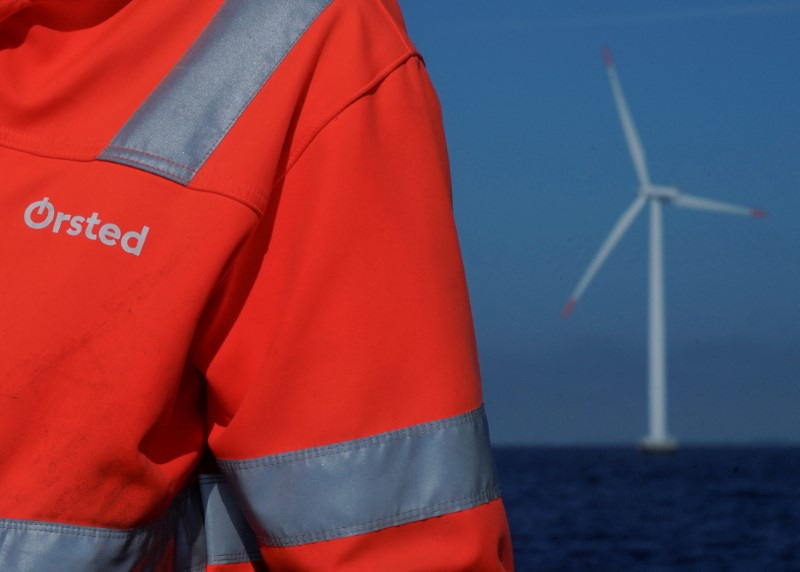By Stine Jacobsen
COPENHAGEN (Reuters) – European wind shares fell on Tuesday after U.S. President Donald Trump axed help for brand spanking new offshore wind energy on his first day in workplace, including to ache in an business that had turned to the US to assist revive its fortunes.
The most important decliner, Denmark’s Orsted (CSE:), which plunged 17%, got here below additional pressure from impairments on its U.S. ventures.
The worldwide offshore wind business, which initially boomed, has been struggling to ship the carbon reductions pursued by many governments as escalating prices, provide chain points and planning points have slowed growth.
U.S. prospects for wind had regarded extra beneficial due to former president Joe Biden’s inexperienced funding coverage.
However Trump, lengthy recognized to favour fossil fuels, on Monday suspended new federal offshore wind leasing pending an environmental and financial overview, saying wind generators are ugly, costly and hurt wildlife.
Orsted on Tuesday reported 12.1 billion Danish crowns ($1.69 billion) in impairment prices associated to the U.S. offshore market, triggering a selloff that dragged its share worth to some 84% beneath a peak in 2021.
A delay and better prices for Orsted’s Dawn Wind mission, which is predicted to be the most important U.S. offshore wind farm as soon as accomplished, had been the principle motive for the plunge, analysts mentioned.
However the firm additionally flagged impairments on seabed leases that could possibly be instantly linked to Trump, Sydbank analyst Jacob Pedersen informed Reuters.
“Orsted now has some assets in the U.S. that are worthless. If there is nothing to be built because of Trump, Orsted can neither sell nor use the leases,” he mentioned.
Different corporations, together with wind growth corporations, fell by smaller percentages.
Portugal’s EDP Renovaveis (ELI:) shares fell by round 1.6%, Germany’s RWE (LON:) shed round 0.5%, Norway’s Equinor dropped by 2.2% and wind turbine producer Vestas fell by almost 3% in afternoon commerce.
Italy’s Prysmian (BIT:), the world’s largest cable maker and a significant participant in offshore wind transmission, on Tuesday mentioned it will abandon a plan to construct a plant in the US to make cables for offshore wind parks.
Its shares, which closed at a file excessive on Monday, misplaced round 1% on Tuesday.
RWE SAYS NO IMPAIRMENT
Germany’s RWE, the world’s second-largest offshore wind mission developer after Orsted, mentioned there was no want for impairments on a 2.8 gigawatt U.S. offshore wind mission it’s collectively growing with Britain’s Nationwide Grid (LON:).
“The Executive memorandum on offshore wind did not come as a surprise,” the corporate mentioned. “We currently see no need for impairments as the seabed lease is valid for at least until the 2060s, so it’s a long time to go to realise the project at a later stage.”
EDPR and Vestas declined to remark.
Vestas secured an order from Equinor final yr to energy New York’s Empire Wind 1 offshore wind mission, whereas EDPR has a 50-50 offshore wind JV with Engie referred to as Ocean Winds that’s growing the Southcoast Wind mission off the coast of Massachusetts, as a result of start development late this yr.
Germany’s vice chancellor Robert Habeck informed a convention in Berlin that Europe must proceed increasing low-carbon vitality in the course of the Trump presidency, no matter insurance policies and his deliberate withdrawal from the Paris local weather settlement.
The American Clear Energy Affiliation (ACP), a U.S. clear vitality business group, mentioned it strongly opposed Trump’s government order on wind leasing and allowing.
“States voting for President Trump are eight of the top 10 states in terms of reliance on wind power with many depending on wind for a significant share of their electricity use. Restricting wind development in these regions is certain to increase consumer energy bills,” it mentioned.

Though opposing wind, Trump issued a flurry of orders meant to spice up vitality manufacturing from different sources, driving up shares of U.S. nuclear energy corporations.
($1 = 0.9614 euros)




